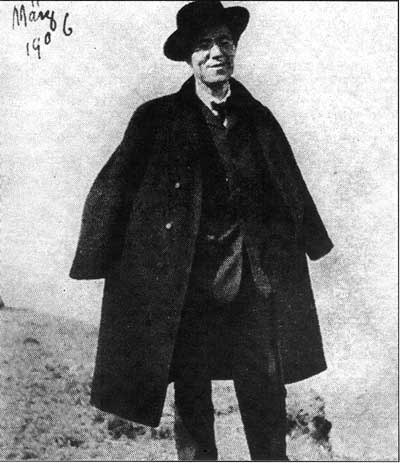Mahler's response to Wagner
Though a great interpeter of Wagner's works, Gustav Mahler was by no means a Wagnerian. While his music owed much to songs of Tristan and Siegfried, his philosophies owed them nothing.
Wagner's writings and music created a culture of ideal and counter-ideal by which all humans could be measured. A person would not fit into the "Wagnerian nation" if he or she did not meet certain requirements: physical splendor, intellectual and spiritual superiority, and strength of will. Anyone who did not fit the ideal of Tristan, Wotan, and Siegfried would shrink to Mime--effeminate, cunning, and weak.
Throughout his career, Mahler heard these accusations as though Das Judenthum in der Musik was being read to him over and over again. He was nervous, weak, and modern--a Jew through and through--and had no business partaking of the culture, no less the music, of Richard Wagner.
Mahler addressed these criticisms not through political campaigns or open letter to the press, but in the only way he knew. In his Third Symphony, he recomposed the world according to his own beliefs--creating his own "nation" in his music.
Mahler's nation
In his Third, Mahler preached redemption for all beings, from the angels to the flowers of the field. He placed Man in the midst of creation, not as its goal, but as a goal-seeker. In no way was Mahler's Man superior to all nature, but he was, in fact, able to free himself from it and seek "deep eternity." Mahler's philosophy was one of universal potential and respect, but it was still realistic. Gone were mythical swords and rings. Mahler's goals were love and the belief of a child.
What would the world have looked like if Mahler's vision of "nation" had prevailed over Wagner's? Would there be no Hitler without Siegfried? Wagner's music extended beyond its small cult at Bayreuth to engulf much of Europe's musical tastes. His philosophies of anti-Semitism and ideal and anti-ideal Men, however, inflamed all of Europe and contributed to the greatest mass murder in human memory.
While Wagner is certainly not to blame for this tragedy, it was his vision that Adolf Hitler worshipped. Unfortunately, it took 13 million murders and a disastrous war to bring down Wagner's ideological predominance. Mahler, on the other hand, resurfaced in the 1960s, only after the Holocaust. It is unfortunate that this may have been what must have been. Perhaps it took the rise and fall of the Nazis to see the sadly prophetic wisdom of Mahler's philosophies. Luckily, Mahler and his music are still gaining today. Maybe his ideology and "nation" will be recognized, as well. |
 |